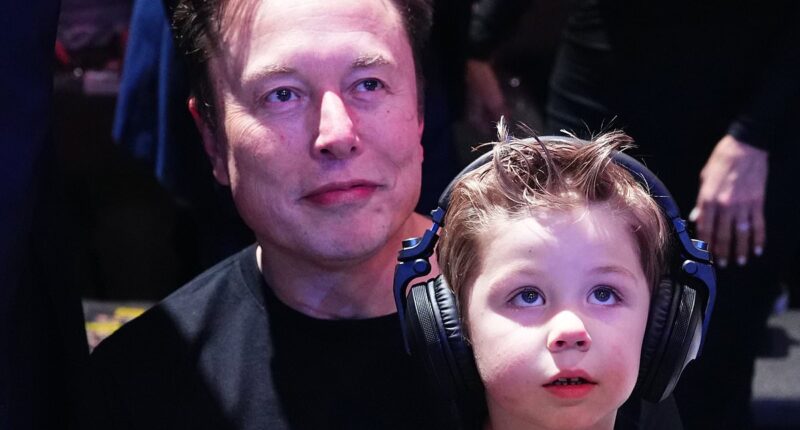
Women worldwide, on average, are having fewer children now than previous generations.
The global population is projected to decline in several countries by the year 2100 due to various factors such as improved access to education and contraception, an increasing number of women entering the workforce, and shifting societal norms regarding family size.
Dr. Jennifer Sciubba, the author of the book “8 Billion and Counting: How Sex, Death, and Migration Shape Our World,” emphasized that individuals are opting for smaller families, a trend that is likely to be long-lasting.
‘So it’s wise to focus on working within this new reality rather than trying to change it,’ she said.
Sex education and contraception
A rise in education and access to contraception is one reason behind the drop off in the global fertility rate.
Advancements in education regarding pregnancy and birth control have played a significant role in this demographic shift, with sex education courses becoming prevalent in the United States since the 1970s and later becoming mandatory in the United Kingdom in the 1990s.
‘There is an old adage that ‘education is the best contraception’ and I think that is relevant’ for explaining the decline in birth rates, said Professor Allan Pacey, an andrologist at the University of Sheffield and former chair of the British Fertility Society.
Elina Pradhan, a senior health specialist at the World Bank, suggests that more educated women choose to have fewer children due to concerns about earning less when taking time off before and after giving birth.
In the UK, three in 10 mothers and one in 20 fathers report having to cut back on their working hours due to childcare, according to ONS data.
They may also have more exposure to different ideas on family sizes through school and connections they make during their education, encouraging them to think more critically about the number of children they want, she said.
And more educated women may know more about prenatal care and child health and may have more access to healthcare, Ms Pradhan added.
Professor Jonathan Portes, an economist at King’s College London, said that women’s greater control over their own fertility means ‘households, and women in particular, both want fewer children and are able to do so’.
More women entering the workplace
More women are in the workplace now than they were 50 years ago — 72 vs 52 per cent — which has contributed to the global fertility rate halving over the same time period.
Professor Portes also noted that the drop-off in the birth rate may also be down to the structure of labour and housing markets, expensive childcare and gender roles making it difficult for many women to combine career aspirations with having a family.
The UK Government has ‘implemented the most anti-family policies of any Government in living memory’ by cutting services that support families, along with benefit cuts that ‘deliberately punish low-income families with children’, he added.
As more women have entered the workplace, the age they are starting a family has been pushed back. Data from the ONS shows that the most common age for a women who were born in 1949 to give birth was 22. But women born in 1975, were most likely to have children when they were 31-years-old.
In another sign that late motherhood is on the rise, half of women born in 1990, the most recent cohort to reach 30-years-old, remained childless at 30 — the highest rate recorded.
Women repeatedly point to work-related reasons for putting off having children, with surveys finding that most women want to make their way further up the career ladder before conceiving.
However, the move could be leading to women having fewer children than they planned. In the 1990s, just 6,700 cycles of IVF — a technique to help people with fertility problems to have a baby — took place in the UK annually. But this skyrocketed to more than 69,000 by 2019, suggesting more women are struggling to conceive naturally.
Declining sperm counts
Reproductive experts have also raised the alarm that biological factors, such as falling sperm counts and changes to sexual development, could ‘threaten human survival’.
Dr Shanna Swan, an epidemiologist at Icahn School of Medicine at Mount Sinai in New York City, authored a ground-breaking 2017 study that revealed that global sperm counts have dropped by more than half over the past four decades.
She warned that ‘everywhere chemicals’, such as phthalates found in toiletries, food packaging and children’s toys, are to blame. The chemicals cause hormonal imbalance which can trigger ‘reproductive havoc’, she said.
Factors including smoking tobacco and marijuana and rising obesity rates may also play a role, Dr Swan said.
Studies have also pointed to air pollution for dropping fertility rates, suggesting it triggers inflammation which can damage egg and sperm production.
However, Professor Pacey, a sperm quality and fertility expert, said: ‘I really don’t think that any changes in sperm quality are responsible for the decline in birth rates.
‘In fact, I do not believe the current evidence that sperm quality has declined.’
He said: ‘I think a much bigger issue for falling birth rates is the fact that: (a) people are choosing to have fewer children; and (b) they are waiting until they are older to have them.’
Fears about bringing children into the world
Choosing not to have children is cited by some scientists as the best thing a person can do for the planet, compared to cutting energy use, travel and making food choices based on their carbon footprint.
Scientists at Oregon State University calculated that the each child adds about 9,441 metric tons of carbon dioxide to the ‘carbon legacy’ of a woman. Each metric ton is equivalent to driving around the world’s circumference.
Experts say the data is discouraging the climate conscious from having babies, while others are opting-out of children due to fears around the world they will grow up in.
Dr Britt Wray, a human and planetary health fellow at Stanford University, said the drop-off in fertility rates was due to a ‘fear of a degraded future due to climate change’.
She was one of the authors behind a Lancet study of 10,000 volunteers, which revealed four in ten young people fear bringing children into the world because of climate concerns.
Professor David Coleman, emeritus professor of demography at Oxford University, told MailOnline that peoples’ decision not to have children is ‘understandable’ due to poor conditions, such as climate change.

















